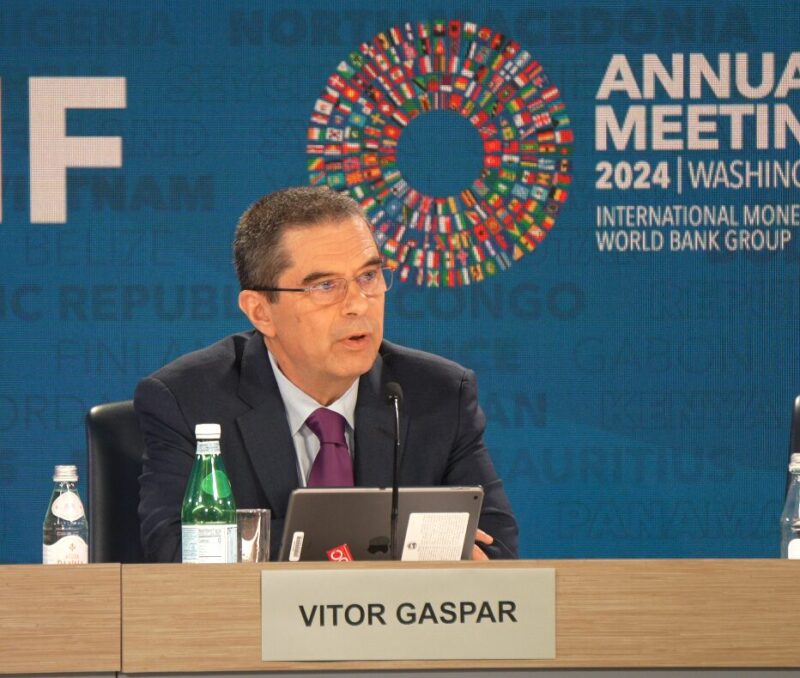The International Monetary Fund (IMF) has projected Ghana’s Debt-to-Gross Domestic Product ratio for 2024 to 82.9%..
This was contained in the 2024 Fiscal Monitor Report released on the sidelines of the annual IMF/World Bank Meetings in Washington DC USA.
The Bank of Ghana’s Economic and Finance Data ending September 2024 puts Ghana’s Debt to GDP ratio in July 2024 at around 75.7%.
Ghana’s total revenue mobilised at the end of 2024 as a percentage of GDP will however reached 16. 9%.
This represents a marginal increase from what the IMF projected in 2023.

The revenue data also revealed that Ghana has not done much in improving revenue collections.
Debt Exchange Programme and impact on the GDP ratio
The report was based on government’s debt and projections before the Debt Restructuring Programme.
Some officials at the Ministry of Finance told JOYBUSINESS in USA that government expects the Debt-to-GDP Ratio to come down significantly once the Debt Restructuring Programme is included. .
Government has stated that the revised Debt-to -GDP ratio shows that the country is approaching debt sustainability levels by 2028 as projected by the IMF.
Outlook for Ghana’s Debt-to-GDP Ratio
The report further forecasts that Ghana’s Debt-to-GDP ratio will reduce to 79.5% in 2025.
This is the second time the Bretton Woods institution has projected that the debt stock as a percentage of GDP will reduce.
IMF on global debt outlook
The IMF has expressed concerns about the global public debt, describing it as very high.
It is expected to exceed $100 trillion (93% of global GDP) in 2024 and to keep rising through the end of the decade (approaching 100% of GDP by 2030).
Although debt is projected to stabilize or decline in about two thirds of the world’s countries, it will remain well above levels foreseen before the pandemic.
“Countries where debt is not projected to stabilize account for more than half of global debt and about two-thirds of global GDP”.
“The political discourse on fiscal issues has increasingly tilted toward higher government spending in recent decades”.
“Fiscal policy uncertainty has increased, and political redlines on taxation have become more entrenched” the report said.
“Spending pressures to address green transitions, population aging, security concerns, and long-standing development challenges are mounting”, it added.
Latest Stories
-
Center for Learning and Childhood Development Director Dr Kwame Sakyi honoured at Ghana Philanthropy Awards
6 hours -
Asantehene receives 28 looted artefacts
7 hours -
CAF WCL 2024: Ghana’s Thelma Baffour wins title with TP Mazembe
8 hours -
Benjamin Boakye slams politicisation of energy sector issues and ECG’s inefficiencies
8 hours -
Erastus Asare Donkor and Dr Neta Parsram win big at 10th Mining Industry Awards
8 hours -
Government is “suppressing information” about power sector challenges – IES Director
8 hours -
Majority of our debts caused by forex shortfall – ECG Boss
9 hours -
Pan-African Savings and Loans supports Ghana Blind Union with boreholes
9 hours -
Bole-Bamboi MP Yussif Sulemana donates to artisans and Bole SHS
9 hours -
Top up your credit to avoid potential disruption – ECG to Nuri meter customers
10 hours -
Dutch & Co wins 2024 Entrepreneur of the Year Award
10 hours -
We’ll cut down imports and boost consumption of local rice and other products – Mahama
12 hours -
Prof Opoku-Agyemang donates to Tamale orphanage to mark her birthday
13 hours -
Don’t call re-painted old schools brand new infrastructure – Prof Opoku-Agyemang tells gov’t
14 hours -
Sunon Asogli plant will be back on stream in a few weeks – ECG
14 hours

